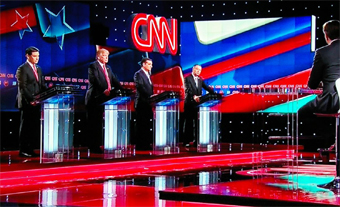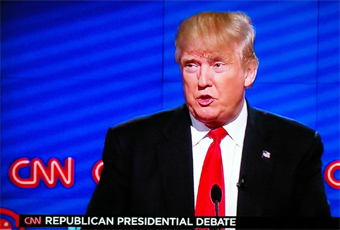
Images courtesy of CNN
Republicans Debate in Miami in Insult-Free Forum
| published March 11, 2016 |
By R. Alan Clanton, Thursday Review editor
There was no mud-slinging, there were no insults traded, there was no body part humor, there were no snide remarks about wet pants or sweaty faces. The word “liar” was never used, except as ordnance against Hillary Clinton. In fact, it was arguably the most civil and sedate debate the Republicans have conducted so far in this election cycle, but that isn’t to say it was not without red meat or controversy.
With Donald Trump still dominating the Republican field, the four remaining candidates in the GOP race for President met on stage in the vast auditorium at the University of Miami to hash out their differences one last time before voters in several key states—Florida among them—go to the polls next week to pick their choice as the Republican nominee.
The stakes are extremely high for all of Trump’s rivals, most especially Florida Senator Marco Rubio—now engaged in a brutal fight for survival in his home state, and Ohio Governor John Kasich, who is locked in a tight fight in the Buckeye State with Trump. Trump’s other rival, Texas Senator Ted Cruz, has every reason to want to see Rubio and Kasich go away, for Cruz wants to make the nomination battle a one-on-one joust between himself and the real estate tycoon.
Either way, the likelihood of a rapid Trump victory over his rivals seems certain if either Kasich loses to Trump in Ohio, or Rubio loses to Trump in Florida. If, however, the anti-Trump forces prevail over the next few weeks, Republicans could be headed toward their first brokered national convention since 1964, when Barry Goldwater and Nelson Rockefeller fought bitterly for control of the GOP’s future.
In a two-hour-plus debate in Miami noted for its civility and relative calm—a shift in tone and style so at odds with the pattern already set in nearly all previous GOP forums that at first it seemed almost unnerving—Donald Trump remained generally restrained, reining-in his usual boisterous behavior, and engaged in what some analysts suggested was a patient running-out-of-the-clock strategy. The result: none of the other candidates engaged in any form of direct attack, save for the several sharp policy differences on issues like trade and immigration, and the debate may have been the first GOP forum in which not a single personal barb was traded.
Comments on social media ranged from jokes (“did they all take Prozac before coming out on stage?”) to amazement (“Wow, 45 minutes in and no one has jabbed a two fingers into anyone’s eyes!”).
In a debate that was notable for its civility and decorum, even Trump seemed restrained and on-topic. So smoothly did the process run that at 45 minutes into the proceedings Donald Trump commented—at the very moment it looked like the brass knuckles and the knives were about to come out—that the debate was unusually decorous and substantive. If anyone had in fact pulled their switchblade out, they quickly sheathed it, and the forum remained a model of good behavior—no interruptions, no cross talk, no bickering, no insults.
CNN’s Jake Tapper raised the issue of trade and trade deals right out of the gate, asking the candidates to explain their substantial differences with Trump who has made one of his signature issues -- the damage caused by recent trade deals, which the billionaire sometimes characterizes as “disastrous.” With jobs and economic security the number one worry for Americans regardless of political party, the thorny issue of export/import trade deals and jobs flowing to foreign countries remains front and center for both Democrats and Republicans.
All candidates were in general agreement that too many American jobs have flowed overseas. Tapper asked Kasich if his support of past deals amounted to de facto encouragement of businesses moving millions of jobs out of the United States. Kasich—who touted his family’s blue collar background—said he favors “free trade, but fair trade,” and stressed that barring trade or shuttering the U.S. to all foreign trade is a recipe for high prices on consumer goods and a spiral of inflation. “People will buy less,” Kasich said, “and other people will be out of work.”

But when Tapper pivoted the question to Trump, exposing the billionaire’s penchant for talking tough on trade while at the same time overseeing companies which hire foreign guest workers instead of American workers, and moving some company operations to Mexico, China and Taiwan, Tapper sought to expose Trump as a hypocrite in his actions and deeds. But Trump shrugged it off, suggesting—as he often does when confronted with business practices seemingly at odds with his campaign talk—that he was, like any other shrewd businessman, merely taking advantage of the laws and guidelines on the books.
“Nobody knows the system better than me,” Trump declared, adding “I know the H-1B. I know the H-2B [referring for laws governing guest worker programs and foreign workers]. Nobody knows it better than me. I’m a businessman. These are laws…these are regulations…these are rules. We’re allowed to do it.” Trump also stressed that businesses find it hard to resist such laws and programs, since other countries engage in deliberate devaluations of their currencies in an effort to make such arrangements profitable.
“But I’m the one who knows how to change it,” Trump said, “no one else on this dais knows how to change it like I do, believe me.”
When the question pivoted to Rubio, he too stressed that he supports free trade, but only those deals that are good for America.
“We’re five percent of the world’s population,” Rubio declared, “so if all we do is sell things to each other, we can only sell to five percent of the people on Earth.” Rubio cited recent trade deals with Columbia which have allowed numerous businesses to flourish in Florida, but said that similar deals with Mexico have not worked out as well.
“If it is a free and fair trade deal,” Rubio said, “we can compete against anyone in the world, and we need to in the 21st Century.”
Cruz blamed the current Obama administration for forging weak trade deals—especially those trade deals which allow U.S. jobs to flow overseas—and he said those hardest hit are those in the manufacturing sector: steel, automotive, even services. But Cruz also said that “trade and immigration are interwoven,” and that trade has to be crafted to best benefit U.S. workers, not boardrooms.
When reporters Stephen Dinan of the Washington Times, one of the guest moderators, asked Rubio about his support of expanding the H-1B in light of recent complaints that Florida-based companies such as Walt Disney use the program to eliminate American workers and replace them with seasonal foreign workers, Rubio responded by saying that Disney’s recent actions—which resulted in hundreds of layoffs—were an obvious abuse of the guidelines and rules. Rubio also explained that what many U.S. companies now do is farm out the guest visa program to secondary or tertiary vendors, many based in India, Pakistan or various African nations (Rubio used the example of the firm Tata, which exports Indian labor to the U.S.), despite the fact that those same companies have failed to even look at qualified Americans.
Companies like Tata, Rubio says, simply “hoard visas” by buying them up and reselling to American firms, which Rubio says is a clear abuse—and involve nothing more elegant than simply outsourcing using a loophole in the law.
Kasich, as he often does, says he supports securing the border—likening it to the common sense approach of locking doors at night. Kasich also believes that for the 11.5 million in the U.S. illegally, that a pathway to legalization ought to be available, especially if those individuals have committed no crimes.
The debate in Miami was perhaps the most substantive for all four candidates, though one could argue that Trump generally stuck to his time-honored tactic when it comes to policy discussions: give broad assertions of “we’re going to fix things” and “we will negotiate better deals,” but deliver few, if any, specifics. Example: when the moderators attempted to pin him down on how he intends to fix Social Security without raising taxes, cutting benefits, or raising the minimum retirement age, he offered his usual wave-of-the-hand grand strategy: bring wealth back to the U.S., eliminate waste in government, create so much economic dynamism that Americans will be awash in money and the government will have a surplus.
The debate was, on the whole, an opportunity for all four candidates to do no harm—but also to once again attempt to stand out from what remains of the once-crowded pack. But Trump, clearly employing a more subdued strategy and seeking now to perhaps seal the deal with Republican voters by appearing more restrained and Presidential, gave the other candidates little to punch back at—accustomed as they have become to having to engage routinely in Trump’s often antic behavior and goading taunts. On his best behavior, the other candidates found themselves on their best behavior as well.
The prevailing view is that Trump wants to make no mistakes. Why fumble the ball now when the goal line is so close? Risk-averse going into another set of important primary states on Tuesday, the other three candidates found little reason tactically during the debate to change the tone; as always, trump sets the pace and the tenor.
But the alternate view is perhaps more compelling. Sensing that victory may be only a matter of weeks away, Trump not only wants to appear presidential to GOP voters in Florida and Ohio (the very ones who will be voting on Tuesday), he also wants his debate performance to translate directly to independent voters and potential crossover Democrats in the fall. In that sense, he is playing to a deeper field in the same two key electoral states—looking ahead to a general election in which he will face either Hillary Clinton or Bernie Sanders. Trump is also planting the seeds of a more subdued image for voters watching in Illinois, North Carolina, and Missouri—again, battleground states not merely for their potent delegate counts, but also for the fact that those same states can prove pivotal in the Electoral College.
Still another viewpoint, which could be seen as part of either of the above strategies: Trump senses he is on the verge of victory, but—in the unlikely event he falters in Florida or Ohio, or later in Illinois—he wants to maintain the upper hand going into the convention in Cleveland, where he will find himself bargaining and negotiating with the party elders and the party elites. Like any good businessman, he is keeping his options open. He even said as much during the debate in what may be a very clear clue as to his intentions to start playing by the rules as long as the party plays by its rules.
“One of the biggest political events anywhere in the world is happening right now in the Republican Party,” Trump said in his opening comments, citing increased voter turnout and participation in primaries and caucuses, and a sharp increase in voter registration—notably for the Republican Party. “They’re voting out of enthusiasm. They’re voting out of love. Some of these people, frankly, have never voted before.”
Then Trump added the clincher.
“I think, quite frankly, that the Republican establishment, or whatever you want to call it, should embrace what’s happening.”
Related Thursday Review articles:
Rubio Blasts CNN Reports of Campaign Shutdown; R. Alan Clanton; Thursday Review; March 8, 2016.
Trump Inches Closer to the Nomination; R. Alan Clanton; Thursday Review; March 9, 2016.
